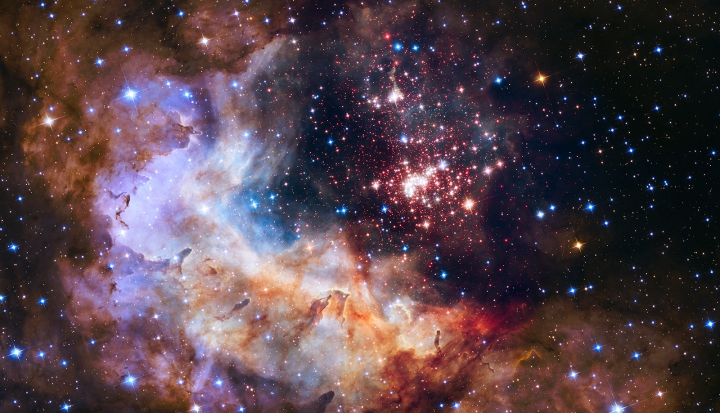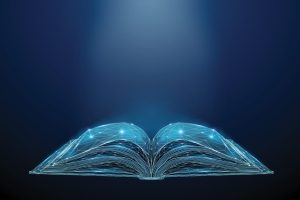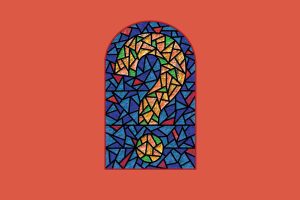When Heather Camm, a chemistry teacher at an all-girls Catholic high school, began designing a new, year-long course in scientific ethics, she knew she would have to address the one issue that could undercut the rest of her lessons. Before she could get to evolution, reproductive technology, nuclear energy, and the origins of the universe, she would have to discuss Galileo.
“There’s a lot of misinformation,” she said last summer, as she prepared to head into her second year teaching the class at Padua Academy in Wilmington, Delaware. “That’s what’s at stake with this course—correcting a lot of that mis-information.” She went on to quote Catholic writer George Weigel: “No incident had done more to sustain the image of the Catholic Church as an authoritarian enemy of human progress than the 17th-century Galileo case.”
The 400-year-old case of Galileo is notorious; one of his most well-known conflicts with the church resulted when the great scientist, who had invented the telescope, began arguing in “The Starry Messenger” in 1610 that the sun was the center of the solar system. It was not his own theory, but it was an unproven and unpopular one. (Of course, it also happened to be correct.) The Catholic Church declared heliocentrism heretical in 1616, and Galileo’s conflict with the church hierarchy escalated in the coming years. Finally, he was tried for “holding as true the false doctrine taught by some that the sun is the center of the world.” The scientist lived under house arrest for eight years before his death, eventually recanting his heliocentric views.
Today, both the true story of the Galileo incident and funhouse mirror versions of it loom large over the church’s reputation. Camm says when she asks adults about it, many wrongly say the church burned Galileo at the stake. The case lives on in popular culture and even within Catholic culture, as evidence of the church’s hostility to science and reason.
“The Galileo affair seems to cast a pall of doubt over everything else,” says Chris Baglow, a professor of theology at Notre Dame Seminary in New Orleans. “It sits in the background and everything else seems to be window dressing. It’s as though [people think], ‘This is really what the church is.’ ”
But the lingering power of a juicy episode from 17th-century history is not the only problem for the church’s contemporary scientific reputation. “There’s a considerable deficit in scientific learning and understanding among American Christians,” says Darren Sherkat, a sociologist at Southern Illinois University who has conducted research on scientific literacy and religion. “It’s really not a point of debate outside of people who feel offended by it.”
Sherkat’s 2011 paper, published in Social Science Quarterly, is not good news for American Christians. Sherkat uses data from the General Social Survey, which includes a section of 13 questions on very basic scientific literacy, covering topics including continental drift, male determination of the sex of a baby—and heliocentrism. Sherkat finds that although Catholics performed better than sectarian Protestants, they performed worse than both non-Christians and the non-religious. The paper concludes: “Religion plays a sizeable role in the low levels of scientific literacy found in the United States, and the negative impact of religious factors is more substantial than gender, race, or income.” In particular, Catholics’ “scientific proficiency does not match their educational position.”
When it comes to scientific literacy, American Christians—Catholics included—have both an image problem and a reality problem. That reputation is partly the result of misunderstanding and partly a result of a real phenomenon in both American and American Catholic culture.
How has scientific illiteracy become an American crisis, and why should it concern Catholics in particular? Can a basic understanding of science illuminate a Christian’s understanding of God?
In a year in which Pope Francis issued a clarion call for attention to climate science, these are questions that seem more pressing now than ever.
A problem of national culture
Scientific illiteracy is not just a problem for Christians, let alone just for Catholics. To share just a few of the dramatic and alarming statistics that regularly make headlines in the United States: twenty-six percent of Americans do not know the Earth orbits the sun. Only 50 percent of Americans say climate change is due primarily to human activity (that’s compared to 87 percent of scientists). Just 37 percent of people think it’s safe to eat genetically modified foods (88 percent of scientists say it’s safe). Barely more than half of Americans know that astrology—yes, astrology—is “not at all scientific,” a share that has actually been declining in recent years.
You get the picture. Intriguing, however, is that Americans profess to be highly interested in science. Four out of five of us say we’re interested in “new scientific discoveries,” according to a large survey by the National Science Foundation; that’s a higher level of interest than Europeans show. STEM—the acronym referring to the disciplines of science, technology, engineering, and math—has become the favorite child of education experts in recent years. Earlier this year, the Obama administration touted the fact that its Educate to Innovate program has resulted in more than $1 billion for STEM programs nationwide; it’s a theme he has raised in several State of the Union addresses. When Pew Research Center and Smithsonian magazine polled Americans in 2013 on which subjects they thought schools should emphasize more, almost half named a STEM subject.
So there’s a paradox: Americans seem to have low levels of scientific literacy even as they have high respect for science. For Catholics, the picture is even more complicated. As Sherkat’s research suggests, Christians as a whole display lower levels of scientific literacy than the general population. On some fine-grained measures, however, Catholics in particular aren’t doing so badly. According to a 2013 Pew survey, for example, 68 percent of white non-Hispanic Catholics (correctly) say that humans have evolved over time, compared with 60 percent of American adults overall. Fifty-three percent of Hispanic Catholics agree—and that still makes them almost twice as likely as white evangelical Protestants to hold the scientifically sound view.
Still, Sherkat’s research suggests Catholics do have lower levels of overall scientific literacy than non-Christians. He offers two explanations for this: First, the American Catholic population has a large cohort of immigrants, who have different educational backgrounds. And second, Catholic schools, while often strong in overall academics, traditionally tend to focus more on the humanities than the sciences. Since people usually associate with people similar to themselves, this creates a sort of feedback loop of scientific apathy, if not illiteracy. “They’re going to law school,” Sherkat says of top Catholic students. “They’re not going to MIT.”
In other words, the issue of Catholics and scientific literacy is not an issue that can be completely blamed on American culture as a whole. “The statistics are distressing because it means Catholic educators are failing at a goal of Catholic education, the integration of scientific understanding and Catholic knowledge,” says Baglow, the author of Faith, Science and Reason: Theology on the Cutting Edge (Midwest Theological Forum), a 2009 textbook for Catholic high school and college students. “A primary goal of a Catholic education ought to be not simply to teach doctrine correctly . . . but to make the Catholic faith the lens through which all the paths to knowledge and truth are seen and appreciated.”
A problem of association
Scientific literacy is not easy to define. Is literacy a simple matter of understanding scientific methods and findings, or does it require a broader embrace of the fruits of scientific research? Is someone who has some knowledge of reproductive technology or embryonic stem cell research, but rejects their use based on religious beliefs, hostile toward science, as some might accuse them?
Stephen Barr, a physicist at the University of Delaware and the author of Modern Physics and Ancient Faith (University of Notre Dame Press), says that lumping together attitudes toward evolution, embryonic stem cell research, and climate change—three areas in which conservative Christians are often thought to be science-deniers—is like comparing “an apple, an orange, and a pear.” Questioning climate-change orthodoxy is something some scientists are still doing, he says; it doesn’t make all such questioners rubes.
Objecting to technology like stem cell research is a moral issue, not an empirical one. (As Pope Benedict XVI put it in 2007, “Scientific research must be encouraged and promoted, so long as it does not harm other human beings, whose dignity is inviolable from the very first stages of existence.”) Of these three frequently cited sticking points, it’s really only evolution, as Barr sees it, in which it’s fair to say scientific illiteracy is at play.
That raises a fact that should be encouraging for Catholic thinkers: The church is not caught up in defending young-earth creationism, and it is not hostile to evolutionary theory. Rather, Protestants have been by far the most aggressive in promoting the idea that creation happened in seven literal days and have insisted that Darwinian evolution is incompatible with the Christian faith. One of the most well-known opponents of evolutionary theory is Ken Hamm, the founder of the Creation Museum, who debated science educator Bill Nye on evolution at a highly publicized event in 2013.
But it’s not fair to call anti-Darwinism a strictly Protestant problem. Barr says that anecdotally, he has noticed an increase in this belief among American Catholics in recent years. One cause is a result of something he sees as generally positive: Catholics and evangelical Protestants get along much better than they used to. Some prominent evangelicals have converted to Catholicism, and there is simply less bad blood between the two Christian traditions than there was even a few decades ago. The downside to this encouraging trend, Barr says, is that “by interacting with evangelicals closely, some Catholics pick up their anti-evolution views . . . . And since they haven’t learned some of the Catholic ways of looking at things, they’re somewhat susceptible to evangelical Protestant ways of looking at things.” He calls it a “failure of catechesis,” and says it’s been going on for decades.
As Barr sees it, there are two possible ways to remedy the problem. One is to reach opponents of evolution—but that’s an uphill battle, to put it mildly. The other is to make sure Catholics understand the theological traditions of their own church. “There needs to be more to explain to ordinary Catholics how to think about evolution,” he says. “There’s been a vacuum of writing at the level of ordinary people.”
A problem of theology
John Cavadini, a professor of theology and director of the Institute for Church Life at the University of Notre Dame, noticed a troubling trend in undergraduate courses he teaches at the University of Notre Dame. “So many of [the students’] questions came from a misunderstanding of what the church teaches, especially in relation to what science has discovered,” he says. That was particularly true when it came to the doctrine of creation. “Students had the idea that what the church has is a myth and what science has is actual knowledge. When they compare myth with knowledge, as they see it, they pick knowledge.”
Cavadini views that perception of conflict as a failure of theological education and a misunderstanding of doctrine. The story of creation isn’t primitive, disproven science, but the first chapter in a story about meaning and purpose—which science doesn’t say anything about.
By separating science and scripture and showing young people how both have meaning, “you can ease this tension people feel between science and religion and show that religion is not just a myth or a superstition,” Cavadini says.
“You just start getting them to reflect: Where’s the meaning in their lives? Does it come from science, even though science adds a lot of programmatic knowledge that helps human life flourish? In the end, what do you mean by flourish? If a pill for immortality became available, so you lived life forever in health on earth, would you be happy? If you’re bored eternally or your life leads nowhere, that’s a definition of hell.”
Baglow, too, chalks up perception of any tension between science and faith to a lack of knowledge of existing doctrine. “There’s a misunderstanding between how God creates and how creatures participate in the process of creation,” he says. “That’s the biggest sticking point for most people.” Too many people, he explains, believe that if something has a physical explanation it is therefore not part of the spiritual world. “If we can explain the physics and mathematics involved in the emergence of the universe, that means we’ve taken the universe out of the list of things God created. Then the question is: Does God do anything?” That faulty view, he says, “comes from a deep weakness in understanding the Catholic doctrine of creation.”
A history of compatibility
Despite some laypeople’s belief that faith and science are often in conflict, the good news is that Catholic theology is uniquely positioned for compatibility with scientific knowledge. Rather than assuming that the Bible is something like an historical and scientific textbook that can be interpreted in a straightforward way, Catholicism allows for and embraces different levels of interpretation. Although Catholic tradition recognizes God is revealed in scripture, “It’s not as simple as me just reading it and saying, ‘Seven days equals seven days,’ ” as Baglow puts it.
It’s no coincidence that some of the most important scientists in history have been Catholics, including René Descartes (who developed analytic geometry), Gregor Mendel (the father of modern genetics), and Louis Pasteur (the chemist who discovered how diseases spread). The 16th-century Polish astronomer Nicolaus Copernicus, who developed the heliocentric theory that later got Galileo in so much trouble, was a canon in good standing with the church. His book, De Revolutionibus Orbium Coelestium (On the Revolutions of the Heavenly Spheres), was not banned by the church until more than 70 years after his death.
Jesuits in particular have a long history of involvement with the sciences. As Jonathan Wright summed it up in his 2004 book, The Jesuits: Missions, Myths, and Histories (HarperCollins), the church has also been a steady promoter and funder of serious scientific endeavors. Major cathedrals in the 17th and 18th centuries were designed for use as solar observatories. The church founded its own scientific research academy in 1603; its current iteration as the Pontifical Academy of Sciences was established in 1936. In 1996, Pope John Paul II delivered a speech to the group that made clear he accepted the theory of evolution. More recently, the academy has hosted a workshop on research that could imitate embryonic stem cells without using actual human embryos—advanced science, without the same moral hazard.
“The church’s record in the history of science is very good,” Barr says, but “this is not widely known because there have been 200 years of propaganda to make it go the other way.”
Today, despite the widespread notion that faith and modern science are irrevocably in conflict, the picture on the ground is much more congenial. “Most educated Catholics accept evolution and they’re not particularly troubled by it,” Barr says. The church supports high tech medical facilities all over the world. Pope Benedict was known as the “green pontiff” for his commitment to the environment. Last year, Pope Francis reminded Catholics that neither evolution nor the Big Bang are incompatible with the idea of a divine creator, and that God is not “a magician with a magic wand.”
The friendliness flows both ways, as it turns out. “There are a lot of scientists who are religious, it’s not uncommon,” Barr says. “Some keep it under wraps because there’s prejudice in the academic world against those who are religious . . . but it’s not like I’m an oddball.”
Barr can recall only two occasions in his long career where fellow scientists gave him any kind of grief about his faith. Indeed, recent research by sociologist Elaine Howard Ecklund found that 18 percent of scientists attend weekly religious services, compared with 20 percent of the general population, and 19 percent pray multiple times a day, compared with 26 percent of the U.S. population. When it comes to religion, the scientific community doesn’t look so different from the rest of us. And Barr emphasizes that the Catholic Church in particular is not poorly perceived among actual scientists. “To the extent it has a bad reputation, it’s just echoes of Galileo.”
What’s next?
Nicanor Austriaco is a molecular microbiologist at Providence College, with a Ph.D. from MIT. He is also a Dominican friar. Austriaco says that in the 21st century, religion and science should be more allied than ever, because both believe in real truths. “We live in a culture in which so much about reality is reduced to preference and belief,” he says. Both science and religion push against that kind of relativism and insist on the existence of certain phenomena, from cells to a sovereign God.
“If God is the way, the truth, and the life, then this truth thing matters,” says Paul Mueller, an American-born Jesuit priest who is now a member of the research staff at the Vatican Observatory. “That’s where science and religion are on the same side.” Mueller is the coauthor of Would You Baptize an Extraterrestrial?, a 2014 book for laypeople on questions at the intersection of faith and science. The title was prompted by a theoretical question posed to Pope Francis last year.
Lately, educators, scientists, and theologians have been working to speak more directly to the general public on these kinds of thorny questions. Austriaco, for example, belongs to Thomistic Evolution, a team of Dominican friars and scholars working on a series of parish bulletin inserts that will engage evolution from a Catholic perspective. They tackle issues like the historicity of Adam and Eve, God’s “providential governance of creation,” and the church fathers’ interpretations of the Genesis creation stories. (The group’s work is available online at ThomisticEvolution.org.)
Austriaco sees the work he does in his lab as connected to his spiritual life. “When I do science I’m looking at my creator, in the same way as when you go the Louvre you’re looking at the creator,” he says. “By studying the creation, you’re getting an idea about the creator.”
Some Catholic schools are both beefing up their STEM offerings and integrating the Catholic worldview into those classes. Baglow, for example, is currently working with a Dominican high school in New Orleans, which is building a new science center and wants to integrate religious training into its lessons. Expanding the popular acronym STEM, its new program is called STREAM: science, technology, religion, engineering, arts, and math. Baglow’s book began as a curriculum commissioned by a Catholic high school in Mobile, Alabama that was also building a new science center and wanted to ensure that the religion curriculum wouldn’t be left behind.
For the past two years, Cavadini’s Institute for Church Life has hosted a weeklong summer seminar for science and religion teachers at Catholic high schools all over the country. Last summer, about 90 teachers from 23 dioceses attended. Gianna Iannucci, who teaches neuroscience, biology, and chemistry at Mercy High School in Middletown, Connecticut, attended for the first time last summer. She says the seminar “made me realize I have a community of people all over the country I can tap into.”
Baglow sees the encouragement of Catholics to invest in science education as a key part of the work that’s left to be done. It’s not just about promoting science, but about new ways of appreciating faith. “When a student finds God in the things that he or she loves, it’s much more likely that they’ll come to find God,” he says. “If a student loves science and fears that perhaps this embrace of science would mean a stepping away from what is sacred or holy or good in the eyes of the church, then obviously there’s going to be a separation within themselves that will not ultimately be helpful for them to live their lives as Catholics who are also scientists. But if they see these things together and see how they shine a light on each other . . . then both disciplines are strengthened.”
In 1992 Pope John Paul II spoke before the Pontifical Academy of Sciences to attempt to formally close the book on that notorious 17th-century case that still dogs the Catholic Church’s reputation. The church, he said, had made a mistake when it condemned Galileo. By then, the move should have been no surprise. As he had put it four years earlier in a 1988 letter to the director of the Vatican Observatory, “Science can purify religion from error and superstition; religion can purify science from idolatry and false absolutes. Each can draw the other into a wider world, a world in which both can flourish.”
This article appeared in the December 2015 issue of U.S. Catholic (Vol. 80, No. 12, pages 12–17).
Image: Flickr cc via NASA Goddard Space Flight Center














Add comment